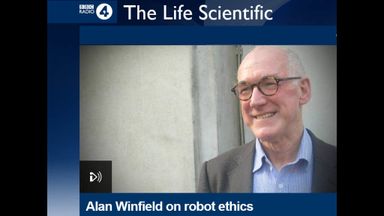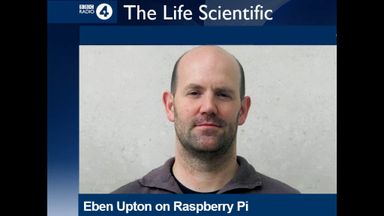The Life Scientific
Eben Upton on Raspberry Pi
Clips from this programme
Introduction (Jim al-Khalili): Eben Upton wanted to get children thinking about how computers think, a chip in every classroom: the Raspberry Pi, now also used on the International Space Station (ISS) by Tim Peake
Duration: 00:54Raspberry Pi (Eben Upton): Why the name, Apricot, Acorn, Python. BBC Micro was Eben Upton's first computer, for programming in the golden age with only a few seriously interested in programming. IBM's pre-university programme
Duration: 02:37Raspberry Pi (Eben Upton): Cheap, small hardware encouraging programming, first became an idea for Eben Upton (PHD in Computer Science) (Moore's law to meet a price point of around $10). 2004: A slump in interest in Computer Science, playing games not programming: Expensive PCs, MACs or Games Consoles
Duration: 04:51Raspberry Pi (Eben Upton): Building the Pi prototypes (Motor control, Robot Wars AVR microcontroller chip work), de-bugging, FORTRAN at Cambridge
Duration: 04:25Raspberry Pi (Eben Upton): Raspberry Pi pitched to the BBC from their history of the BBC Computer Literacy Project, 'things had moved on from the 1980s', BBC's Technology Correspondent Rory Cellan-Jones video blog - 600,000 views of Eben promising a $25 computer meant Pi had to be built. Business challenges, Liz Upton, Pete Lomas credit card sized computer launched 29th February 2012
Duration: 04:53Raspberry Pi (Eben Upton): Sales volumes (100,000 orders on day 1), a not-for-profit licensing company working with partners. The Raspberry Pi Foundation
Duration: 01:11Raspberry Pi (Eben Upton): 'Raspberry Pi2 problem with light affecting the chip scale package (WLCSP) (Peter Onion discovered the problem's cause)
Duration: 02:09Raspberry Pi (Eben Upton): The Pi family including the Raspberry Pi Zero W, reducing the price to £4 thanks to Moore's Law. 15 million units sold. Uptake in schools alongside initiatives like Code Club, teacher training needed.
Duration: 04:14Raspberry Pi (Eben Upton): The Raspberry Pi Foundation as a well as a successful business, Raspberry Pi Trading.
Duration: 02:19The Life Scientific
Alan Winfield on Robots
First broadcast: 21st February 2017
Duration 27:34
Alan Winfield is the only Professor of Robot Ethics in the world. He is a voice of reason amid the growing sense of unease at the pace of progress in the field of artificial intelligence. He believes that robots aren't going to take over the world - at least not any time soon. But that doesn't mean we should be complacent. Alan Winfield talks to Jim al-Khalili about how, at a young age, he delighted in taking things apart. After his degree in microelectronics and a PhD in digital communication at Hull University, he set up a software company in the mid-80s, which he ran for the best part of a decade before returning to academia. In 1993, he co-founded the Bristol Robotics Laboratory at the University of the West of England, by far the largest centre of robotics in the UK. Today, he is a leading authority, not only on robot ethics, but on the idea of swarm robotics and biologically-inspired robotics. Alan explains to Jim that what drives many of his enquiries is the deeply profound question: how can 'stuff' become intelligent.











